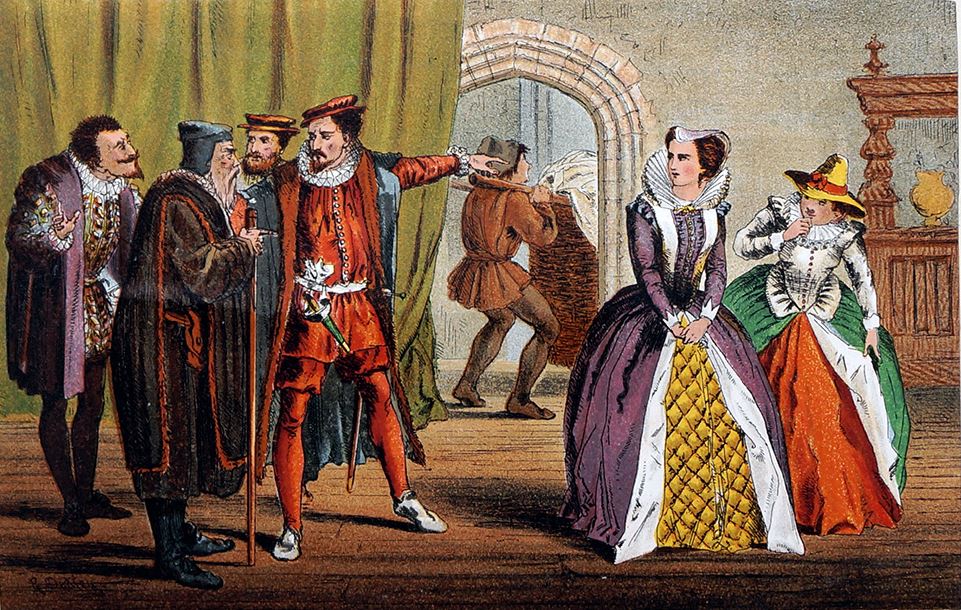Shakespeare’s Dud Jokes
by Ralph Berry (August 2023)

Scene from William Shakespeare’s Merry Wives of Windsor, Robert Dudley, 1856
The Telegraph has lately given its letters over to denouncing Shakespeare’s jokes. This is flogging a horse that died around 1600. Of course his jokes are excruciating, as Shakepeare knew perfectly well. He collected an anthology of them into The Merry Wives of Windsor, making the comedy a Public Record Office of graffiti, a register of underground jokes. Here is that stock property of medical farce, the bedpan joke: ‘Thou art a Castilian King Urinal. I will knog his urinals about his knave’s costard.’ Here are the comic foreigners whose insecure command of language leads to a scatological pun: ‘If dere be one, or two, I shall make-a de turd.’ Mistress Quickly commends a neighbour, ‘She’s as fartuous a civil modest wife.’ Without her, someone might miss the point of the Welsh Sir Hugh Evans:
Sir Hugh: —What is the
focative case,William?
William: O—vocativo—O—
Sir Hugh: Remember, William, focative is caret.
Mistress Quickly: And that’s a good root.
Even the village idiot makes his contribution through Simple’s brief appearance. One imagines that Shakespeare laid down his pen with some relief, after disposing of this account of ignorant stereotypes clashing by night. There are times, certainly, one could mistake Shakespeare’s avocation for scriptwriter rather than playwright. All the same, one comes away from The Merry Wives of Windsor with a feeling of enhanced respect for the author. Only a professional could have done it.
It’s a relief to turn to the rich vein of Shakespeare’s comedy, which has nothing to do with his ghastly jokes. Antony and Cleopatra is the supreme example, said to be a tragedy and indeed so listed in the folio. Cleopatra’s entrance line to Antony has a defining edge to it: ‘If it be love indeed, tell me how much.’ (1.1.4). This is boulevard comedy, with the star actress merciless in her command of the part and subjucation of her lover. The tone is near enough to Noel Coward. That dreaded creature, the first wife, soon appears.
”Fulvia perchance is angry … Where’s Fulvia’s process? … When shrill-tongued Fulvia scolds …”
Cleopatra needs to play off Fulvia to assert her own part (the Mistress, triumphant but potentially betrayed) against the Wife. The repeated assertion makes a fool of Antony, the more so as we hear on other occasions thareally is a termagant of notable dimensions. Still, the marital situation has a certain bult-in stability. And then the bad news breaks. Fulvia dies!
When Antony hears, his first news are the incredulous ‘Where died she?’ (1.2.121) a line that anticipates Talleyrand’s thoughtful reaction to Napoleon’s death, ‘I wonder what he meant by that’. He at once understands that now his wife is dead he has to marry the mistress, or get out of town, fast. No sooner has Cleopatra heard of Fulvia’s death than she clutches the departed rival to her bosom:
‘O most false love! … Now I see, I see,
In Fulvia’s death how mine received shall be. (1.3.62-65)
This is an alliance of Betrayed Women against Brute Men. The final Monument scene is the ultimate test of her conduct. Cleopatra refuses to come down to Antony: ‘I dare not, Lest I be taken.’ (4.15.23-24).
It is the final touch to Shakespears’s black comedy.
Table of Contents
Ralph Berry has spent his career in Canadian universities, ending with the University of Ottawa. After that, he took a Visiting Professorship in Kuwait University, followed by the University of Malaya. In recent years he has written for Chronicles magazine. His hinterland is Shakespeare, but not as a figure of Tudor history. Shakespeare’s works are a mirror to today’s issues and themes, through which we can better understand today’s politics.